
The 1900 Summer Olympics were held as part of the 1900 World's Fair, during which many cycling events were contested. The IOC website currently affirms a total of 3 medal events, after accepting, as it appears, the recommendation of Olympic historian Bill Mallon regarding events that should be considered "Olympic". These additional events include the men's points race. Thus, three cycling events are considered Olympic events. These three competitions were held between 9 September and 16 September 1900. The cycling part of the World's Fair included 250 competitors, 160 of them French. In the sprint and 25 km events, 72 competitors, all men, from seven nations competed.

The men's points race in cycling at the 2004 Summer Olympics consisted of a 160 lap points race with 16 sprints where points were awarded. The event was held on 24 August 2004 at the Athens Olympic Velodrome. There were 23 competitors from 23 nations, with each nation limited to one cyclist in the event. The event was won by Mikhail Ignatiev of Russia, the nation's first victory in the men's points race. Spain's Joan Llaneras, the defending champion, took silver; he was the first and only person to win multiple medals in the relatively short-lived points race, and ended with three medals after another gold in 2008. Guido Fulst of Germany took bronze, the first medal in the event for that nation since 1900.

The men's sprint at the 2004 Summer Olympics (Cycling) was an event that consisted of cyclists making three laps around the track. Only the time for the last 200 metres of the 750 metres covered was counted as official time. There were 19 competitors from 13 nations, with each nation limited to two cyclists. The event was won by Ryan Bayley of Australia, the nation's first victory in the men's sprint after three times coming in second. Theo Bos of the Netherlands took silver, the Dutch team's first medal in the event since 1936. René Wolff earned bronze, stretching Germany's podium streak to four Games.

The men's sprint was one of the three cycling events, all track cycling, now regarded as "Olympic" on the Cycling at the 1900 Summer Olympics programme. It was held on 11 September and 13 September. The sprint, a 2000-metre race with 1000-metre heats, was conducted in four rounds. 69 of the 72 cyclists competed in the sprint, including cyclists from all six competing nations. The event was won by Albert Taillandier of France, with his countryman Fernand Sanz in second place. John Henry Lake of the United States won the nation's first cycling medal with his bronze.
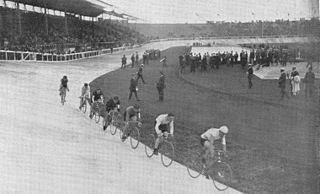
The men's 20 kilometres was one of seven track cycling events on the Cycling at the 1908 Summer Olympics programme. Its distance was the second longest of the individual event distances. Each nation could enter up to 12 cyclists.
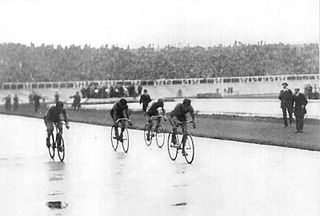
The men's 100 kilometres was one of seven track cycling events on the Cycling at the 1908 Summer Olympics programme. Its distance was the longest of the individual event distances. A challenge cup was presented by the Prince of Wales to the winner. There were 43 competitors from 11 nations. Each nation could enter up to 12 cyclists. The event was won by Charles Henry Bartlett of Great Britain, with his countryman Charles Denny finishing second. Octave Lapize earned bronze, making France the only nation to have medalists at both appearances of the 100 kilometres race.
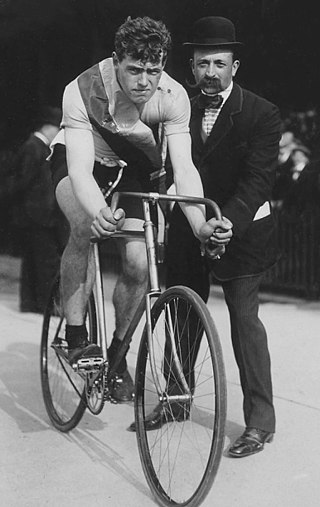
The men's 1000 metre sprint was one of seven track cycling events on the Cycling at the 1908 Summer Olympics programme. Its distance was the second shortest of the individual event distances. Each nation could enter up to 12 cyclists.
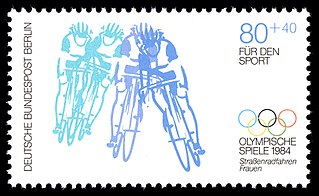
The men's individual road race at the 1984 Summer Olympics in Los Angeles, California, was held on Sunday July 29, 1984. There were 135 participants from 43 nations in the race over 190.20 km, on a course in Mission Viejo, California. The maximum number of cyclists per nation was four. 55 cyclists finished. The event was won by Alexi Grewal of the United States, the nation's first medal in the men's individual road race. All three nations represented on the podium were there for the first time in the event; Canada with Steve Bauer's silver and Norway with Dag Otto Lauritzen's bronze joined the Americans.

The men's points race was an event at the 1988 Summer Olympics in Seoul, South Korea, for which the final was held on 24 September 1988. There were 34 participants from 34 nations, with 24 cyclists competing in the final. Each nation was limited to 1 cyclist in the event. The event was won by Dan Frost of Denmark, with Leo Peelen of the Netherlands taking silver and Marat Ganeyev of the Soviet Union bronze. It was the first medal in the men's points race for each of the three nations.

The men's points race was an event at the 1992 Summer Olympics in Barcelona, Spain. There were 38 competitors from 38 nations, with 24 cyclists competing in the final. Each nation was limited to 1 cyclist in the event. The event was won by Giovanni Lombardi of Italy, the nation's first victory in the event since 1900 and second victory overall; Italy was the first nation to have two wins in the men's points race. Léon van Bon gave the Netherlands its second consecutive silver in the event. Bronze went to Cédric Mathy of Belgium.

The men's points race was an event at the 1996 Summer Olympics in Atlanta, Georgia. There were 28 participants from 28 nations, with 24 cyclists completing the final, which was held on July 28, 1996. Each nation was limited to one cyclist in the event. The event was won by Silvio Martinello of Italy, the nation's second consecutive and third overall victory in the men's points race. Silver went to Brian Walton of Canada and bronze to Stuart O'Grady of Australia; it was the first medal in the event for both nations.

The men's points race was an event at the 2000 Summer Olympics in Sydney, Australia. There were 23 participants from 23 nations competing in the final, which was held on 20 September 2000. Each nation was limited to one cyclist in the event. The event was won by Joan Llaneras of Spain, the nation's first medal in the men's points race. Silver went to Milton Wynants of Uruguay and bronze to Aleksei Markov of Russia; those nations also earned their first medals in the event.

The men's individual road race at the 1952 Summer Olympics was held on 2 August, the 2nd last day of the Olympics on an 11,2 km course running counter-clockwise from Käpylä through Pakila and Maunula and back to Käpylä. The course was circled seventeen times, so the total length of the competition was 190,4 km. About half of the road was hard-surfaced, the other half sand-surfaced. There were 154 entries from 31 nations and 111 participants from 30 nations. Each nation could enter up to four cyclists; nations entering at least three cyclists had the scores of their best three finishers summed for the team road race event. The individual event was won by André Noyelle of Belgium, the nation's first victory in the men's individual road race. His teammate Robert Grondelaers took silver. Edi Ziegler earned Germany's first medal in the event since 1896 with his bronze.

The men's sprint at the 1952 Summer Olympics in Helsinki, Finland was held from July 28 to July 31, 1952. There were 27 participants from 27 nations, with each nation limited to a single cyclist. The event was won by Enzo Sacchi of Italy, the nation's second consecutive victory in the men's sprint. Lionel Cox's silver was Australia's first medal in the event. Werner Potzernheim of Germany took bronze.

The men's points race at the 2008 Summer Olympics took place on August 16 at the Laoshan Velodrome. There were 23 competitors from 23 nations. The event was won by Joan Llaneras of Spain, his second victory in the points race and third consecutive medal in the event. Llaneras was the only person, of any gender, to win multiple medals in the points race, which is no longer on the Olympic programme. His two gold medals made Spain only the second nation to win multiple golds in the men's event; Italy had three. Silver went to Roger Kluge of Germany. Great Britain earned its first medal in the men's points race with Chris Newton's bronze.

The men's sprint at the 2000 Summer Olympics (Cycling) was an event that consisted of cyclists making three laps around the track. Only the time for the last 200 metres of the 750 metres covered was counted as official time. The races were held on Monday, 18 September, Tuesday, 19 September, and Wednesday, 20 September 2000 at the Dunc Gray Velodrome. There were 19 competitors from 14 nations, with each nation limited to two cyclists. The event was won by Marty Nothstein of the United States, the nation's first victory in the men's sprint since 1984 and second overall. Nothstein was the seventh man to win multiple medals in the event. The silver medal went to Florian Rousseau, France's first medal in the event since 1980. Two-time defending champion Jens Fiedler of Germany lost to Nothstein in the semifinals, but won the bronze medal match to become the second man to win three medals in the event.
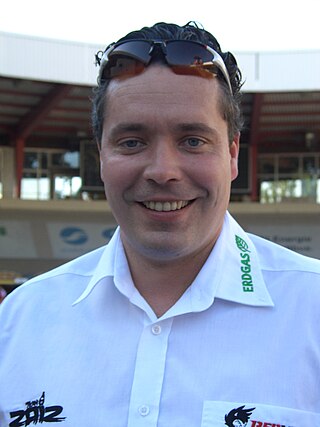
The men's sprint at the 1992 Summer Olympics (Cycling) was an event that consisted of cyclists making three laps around the track. Only the time for the last 200 metres of the 750 metres covered was counted as official time. The races were held on Tuesday, July 28, Wednesday, July 29, Thursday, July 30 and Friday, July 31, 1992, at the Velòdrom d'Horta. There were 23 competitors from 23 nations, with each nation limited to one cyclist. The event was won by Jens Fiedler of Germany, the first victory in the men's sprint for Germany as a unified nation since 1936. Gary Neiwand of Australia took silver, the third time that nation had a runner-up in the event; Neiwand was only the fourth man to win multiple medals in the sprint. Canada earned its first medal in the men's sprint with Curt Harnett's bronze.

The men's sprint at the 1996 Summer Olympics (Cycling) was an event that consisted of cyclists making three laps around the track. Only the time for the last 200 metres of the 750 metres covered was counted as official time. The races were held on July 24 through July 28, 1996 at the Stone Mountain Velodrome. There were 24 competitors from 16 nations, with nations once again being allowed to have up to two cyclists each. The event was won by Jens Fiedler of Germany, the second man to successfully defend an Olympic sprint title. Curt Harnett of Canada also repeated as bronze medalist; he and Fiedler were the fifth and sixth men to win multiple medals of any color in the event. Marty Nothstein of the United States took silver, the nation's first medal in the event since 1984.

The men's sprint cycling event at the 1984 Summer Olympics took place from 31 July to 3 August and was one of eight cycling events at the 1984 Olympics. Once again, the limit on cyclists per nation was raised to 2. The event was won by Mark Gorski of the United States, the nation's first victory in the men's sprint and first medal in the event since John Henry Lake took bronze in 1900. The final was all-American, as Nelson Vails took silver, becoming the first Olympic cycling medalist of African descent. Japan earned its first medal in the men's sprint with Tsutomu Sakamoto's bronze. France's five-Games podium streak in the event ended.
The men's sprint cycling event at the 1988 Summer Olympics took place from 21 to 24 September and was one of the nine cycling events at the 1988 Olympics. There were 25 competitors from 25 nations. After the 1984 Games had featured a humongously bloated 34-cyclist, 11-round, 63-match competition, the competition size was cut down by restricting nations to one cyclist yet again and instituting a qualifying round: this reduced the format to 25 cyclists, 8 rounds, and 29 matches. The event was won by Lutz Heßlich of East Germany, the 1980 gold medalist who was unable to compete in 1984 due to the Soviet-led boycott. Soviet cyclist Nikolai Kovsh took silver, the best result to date for the Soviets. Gary Neiwand of Australia earned bronze; for both the Soviets and Australians, it was the first medal in the event since 1972.
















